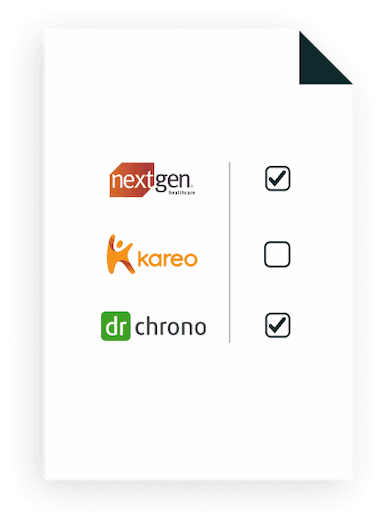Last Updated Dec 2, 2024
Overview
Cardiology EHR software presents an innovative solution for cardiology practices. Streamline documentation, enhance clinical efficiency, and access patient data from any device. With revenue cycle management and customizable workflows, the cloud-based system transforms your practice. Explore a seamless approach to patient care designed to meet your cardiology needs.
Overall Rating
Based on 2 users reviews
4
Rating Distribution
Positive
100%
Neutral
0%
Negative
0%
Starting Price
Custom
Cardiology-Cloud Specifications
Appointment Management/Scheduling
e-Prescriptions
Lab Integration
Patient Portal
What Is Cardiology EHR Software?
Overview
Cardiology EHR, by WRS Health, is a cloud-based integrated practice management software for cardiology practices. By integrating advanced features, Cardiology Cloud EHR aims to streamline workflows, increase accuracy, and improve overall practice efficiency. It offers revenue cycle management, electronic medical records, a user-friendly patient portal, charting, medication management, laboratory and imaging connectivity and more.
What Is Cardiology EHR Software Best For?
Cardiology Cloud EHR's one-click quick charting enhances the patient documentation process. Cardiologists and medical staff can efficiently capture patient data, diagnoses, treatment plans, and other essential information with a single click. This feature eliminates the need for time-consuming manual entries and repetitive tasks, significantly enhancing practice productivity.
Cardiology EHR Pricing
Cardiology EHR Software Integrations
The vendor has not disclosed information about its third-party integrations.
How Does Cardiology EHR Software Work?
Here's how you can navigate the software’s dashboard and make use of its features:
- Log in and set up your user profile and preferences
- Create a new patient file by entering essential information, medical history, and diagnostic details
- Generate and personalize templates, with online charting tailored to various specialties or patient categories
- Utilize the built-in communication tools to collaborate with colleagues and discuss patient cases
- Schedule patient appointments and oversee staff schedules effectively
- Streamline revenue cycle management and submit insurance claims with medical billing
- Access integrated pharmacy and lab systems to streamline prescription and testing processes
Who Is Cardiology EHR Software For?
Cardiology EHR practice management system is ideal for cardiology practices of all sizes, including small clinics, medium-sized practices, and large hospital departments. Its focus on cardiology-specific procedures makes it an asset for cardiologists, nurses, and administrative staff.
Is Cardiology EHR Software Right For You?
Cardiology EHR software could be an ideal fit if you are looking for a cloud-based EHR solution for your cardiology practice to streamline clinical tasks, reduce administrative burdens, and offer built-in actions to improve patient care. The system provides effortless integration of all essential components, encompassing electronic health records, practice management, billing, and analytics.
Additionally, the integrated EHR holds ONC-ATCB certification, making it eligible for MIPS/MACRA incentives for cardiologists. Moreover, the system incorporates specialized Cardiology CPT and ICD10 codes. It is highly scalable and grows with the needs of your practice.
Still unsure if Cardiology EHR software is the right choice for you? Contact us at (661) 384-7070, and we assist you in making the best decision.
Cardiology-Cloud Features
The note templates offer pre-built formats for various cardiology assessments, procedures, and visits. Whether it's an initial consultation, follow-up appointment, or specialized cardiac function, the software provides intuitive templates that streamline notetaking. Cardiologists can ensure standardized documentation, consistency in medical records, and accurate data capture.
This feature allows cardiologists to easily prescribe medications, track patient medication history, and receive alerts for potential drug interactions. The platform also supports e-prescribing, offering submissions to pharmacies, streamlining the prescription process and reducing the risk of errors. By promoting accurate prescriptions and reducing the chances of medication errors, this feature plays a crucial role in enhancing patient safety and overall care quality.
The patient portal allows patients to access their medical records, review test results, schedule appointments, and securely communicate with their cardiologists. Users can actively participate in their care journey by accessing vital health information through a user-friendly online platform. The portal fosters transparency empowers patients to take control of their health and minimizes administrative tasks for both patients and medical staff.
This comprehensive tool helps cardiology practices manage billing processes, claims submission, and reimbursement tracking. By integrating billing functionalities with patient records, this feature minimizes billing errors and ensures accurate reimbursement. Cardiology practices can reduce administrative burdens, optimize revenue cycle management, and improve financial outcomes with automated billing workflows.
The software offers built-in risk assessment tools that assist medical professionals in evaluating patients' risk profiles for conditions such as heart disease and stroke. These tools utilize evidence-based algorithms to calculate risk scores and provide valuable insights. Cardiologists can use risk management to tailor treatment plans and interventions to each patient's unique risk profile, leading to more effective preventive measures and better patient outcomes.
The MIPS reporting feature facilitates the collection, analysis, and submission of MIPS data to regulatory authorities. It helps providers meet MIPS requirements, track performance measures, and earn incentives. This feature allows practices to optimize reimbursement rates and demonstrate their commitment to delivering value-based care.

